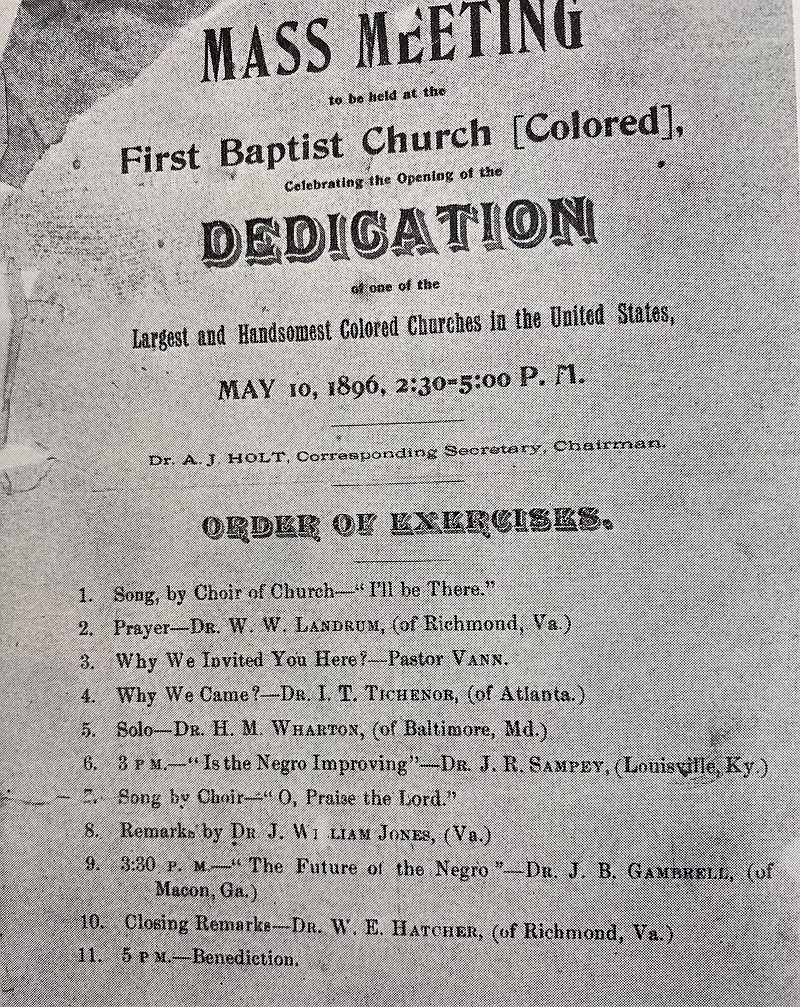The July 17, 1916, Chattanooga Times headline proclaimed "Church's 50th Anniversary," noting that "members and friends of the First Baptist Church on Eighth Street celebrated with special services yesterday," under the leadership of pastor Rev. C.A. Bell. Simultaneously, the congregation applauded the 11th anniversary of Bell's appointment and his stewardship of the congregation and its funds, which included retiring the church's debt, installing a $4,000 pipe organ and increasing church membership. Even as the church prepared to commemorate its historic past, contractors completed repairs on the main auditorium in preparation for the Sunday, July 16, sermon at 11 a.m. to be delivered by Dr. A.M. Townsend, president of Roger Williams University in Nashville. Because it was a special Sunday in the church's history, the Rev. M.W. Moore, pastor of Monumental Baptist Church, was asked to deliver a second sermon at 2 p.m.
By now, you've done the math and realized that First Baptist Church, East Eighth Street, was founded in 1866, just months after Gen. Robert E. Lee had surrendered to Gen. Ulysses S. Grant at Appomattox Courthouse, Virginia. The church, first organized by Chaplain Van Horne, was called Shiloh Baptist. The Rev. Alan Nickerson, the first pastor, served for 19 years, and the faithful met in homes until a structure was erected at the corner of 10th and Lindsay streets. The members called that church "Old Temporary" because they knew it was only the beginning of a congregation that was going to "grow and prosper in the Lord."
The membership increased. A Sunday School was organized, and the aisles were filled with children, reciting Bible verses and joining the singing. When fire destroyed "Old Temporary," a new structure rose from the ashes. Nickerson retired, and the Rev. A.B. Cross assumed the leadership, continuing the church's growth until a disagreement over governance split the church. While Shiloh Baptist continued, a group of the members left and formed St. James Church.
Church members in 1916 pointed to the bricks in the outside walls with pride, sharing stories about the former slaves and veterans of the war who joined together to build the church on its current site under the Rev. C.D. Olden's pastorate. Once again, the membership split, and those remaining at the East Eighth Street site became worshipers at the "Shiloh First Baptist Church."
The Rev. G.W. Parks was "called ... by a substantial portion of the congregation," but Olden refused to resign. For a period, both pastors met with "their" congregations at alternating times, until Olden and his followers left to form New Monumental Baptist Church. Parks and the remaining members changed the church's name from Shiloh to First Baptist and pushed forward, increasing their ministry to the city.
During the next two decades, four ministers answered the leadership call -- the Revs. Michael Vann, A.R. Griggs, G.W. Parks and C.A. Bell. Bell, called to the pulpit in 1905, focused on liquidating the debt while expanding services to all age groups through additional programming. He organized the church into "Twelve Tribes of Israel" that competed in raising funds. His plan worked. Within a short time, the obligations of the church were met, a new pipe organ was commissioned, a heating system was installed, and a new roof adorned the building.
But Bell also was focused on his "true mission of spiritual ministry." During his almost 40 years as pastor, the Men's Service Club, Dunbar Literary Society, Young People's Forum, a May Festival and Boys' Day drew participants -- and new members -- from across the city. When he retired on Feb. 28, 1944, the congregation praised his leadership and wept at his departure, naming him pastor emeritus. When he died four years later, tributes to his faithfulness and leadership streamed into the church from across the nation.
The Rev. W.H. Harris followed Bell, serving 18 months and raising the funds for a church parsonage's purchase at 1024 E. 10th St. The Rev. Percy Williams took over the leadership of the church in 1947, and during his six-and-a-half years as pastor, First Baptist became a popular site for state conferences and spiritual gatherings.
In 1954, a unanimous vote of the membership invited the Rev. H.H. Battle to First Baptist, signaling a new era of revival and community engagement. The excitement was growing.
Linda Moss Mines, the Chattanooga and Hamilton County historian, encourages readers to visit Chattanooga's historic houses of faith. For more information, visit Chattahistoricalassoc.org.
